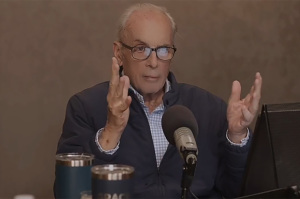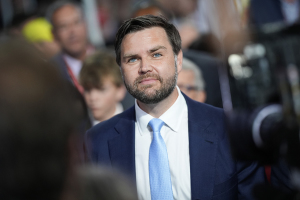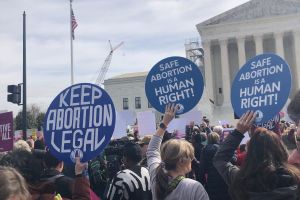An Inside Look at a New Generation of Pastors: Matt Chandler (Pt. 2)
Editor's Note: In a season where every day seems to bring a new assault on traditional biblical views, there are nonetheless a whole new generation of young pastors preaching orthodox biblical Christianity and seeing their churches grow exponentially because of it. The Christian Post has picked but a few of scores of pastors enjoying the favor of God in this way, in an effort to find out what about the Gospel resonates in today's generation.
Pastors interviewed are under 40, most, but not all, in urban settings and are attracting Christians over a wide age spectrum, including Millennials and Generation X. These pastors uphold traditional biblical views of family and morality, yet attract young people and are gaining national reputations.
Today we spotlight Matt Chandler, 39, lead pastor of teaching at The Village Church, a multi-site church in Flower Mound, Texas.
Matt Chandler is all about preaching the Gospel. The megachurch pastor took over what is now known as The Village Church in 2002, and has since seen its average weekly attendance rise from 160 people to about 10,000 people across multiple campuses.
Chandler, who after being diagnosed with brain cancer in 2009 continued to preach during the time he was being treated, is also the president of the Acts 29 Network for church planters and author of The Explicit Gospel.
An edited transcript of Chandler's interview with The Christian Post is below:
CP: How do you explain being able to gather people to orthodox Christianity in a generation that really is growing increasingly opposed to it?
Chandler: The question seems a little strange to me. I think the Gospel of Jesus Christ and orthodox Christianity has always drawn from among culture, even in the most pagan of times, those who would put their trust and hope and belief in Christ. One of the things I've tried to point out often is that the New Testament world, the world in which the Gospel was born, was far more – I wouldn't use the word secular, right, because I think in our current notion of what it means to be secular we're talking about an increased doubt in God's existence and formalized religious organizations being trustworthy. I mean, that's kind of modern day secularism.
But the paganism of the first century, in regards to sexuality, in regards to violence, in regards to socioeconomic separation and racial tension was far more of a mess than what we see here today. And so, in my understanding of history, if you'll just trust in the sufficiency of scriptures, and preach and proclaim in such a way that people can understand it, then I think God's going to draw unto Himself.
I also think that, if you're paying attention, our culture is ripe with examples of why our culture's way isn't working. Hey, this is what culture's telling you is going to make you happy, is going to fulfill your life, is going to make you satisfied, and yet, has that happened? Aren't you all pursuing that? Isn't this what you've been trying? Hasn't this led to heartache? Hasn't this led to disappointment? Aren't you still in your heart of hearts being nagged by something? To be able to, in such a hedonistic culture as ours, to say, "How's that working for you? Maybe God's way would be a better way," and then to be able to show that story played out in the lives of others has been what the Christian church has done since its beginnings.
CP: Can you describe for me what kind of preacher you are? Would you describe yourself as expository or exegetical?
Chandler: I do both of those. I mean, I've gone line by line through books of the Bible and I've done topical messages built around things that are culturally relevant or things that I believe were pressing hard against the church and needed to be addressed. And so I love line by line exposition, but I also preach exegetically.
And what I mean by that is: If I'm going to teach on sexuality, I want to go to what the Bible says about sexuality and break that down, looking at the period of time in which it was written, trusting it as the authoritative, inerrant word of God, and believing that literally it means what it says, then to lay that on top of culture and to find out what our culture is discipling our people in and then try to, once again, deconstruct whether or not what our culture says is going to work is actually working for people.
And I have yet to run across legitimate statistics that support that if you just do whatever feels right to you, you're going to live a fulfilled, happy, glad life. I mean, that's not working. Even in some secular books being written now, this kind of idea of what's finally going to make us fulfilled is simply not happening. And so I'm going to use both exegetical style and expository preaching in order to engage the hearers that God sends me.
CP: Now that we have an understanding of how you preach, how do you approach practical application and sharing that with your congregation?
Chandler: I think there's multiple ways to do practical application. I don't know that when all's said and done I do it the same way week in and week out. I think sometimes the practical application is found in the deconstruction of how our culture views things versus how the Bible explains the life of a Christian should look.
And so you can either do practical application as you're deconstructing or as you're reconstructing. To give you an example, this weekend I'm preaching through our mission statement, and when we talk about Gospel-centered worship I want to be able to say, "This is what it is, and this is where you find it." And so the "this is where you find it" is the practical application. When we talk about Gospel-centered community, I want to say, "This is what it is. This is what the Bible says it is, and this is where you're going to find it here, and this is how you're going to get into it. Here's on-ramps. Here's off-ramps."
And so, say in the series I'm currently in, I'm building a lot of on-ramps and off-ramps for practical application.
CP: How do you set it up in your church so that you can keep the practical application going among your congregation? Or how do you make sure that they are bearing fruit?
Chandler: I think there's a couple of ways that we want to see that happen. The first is, the discipleship process isn't one where there's an arrival date – you know, work real hard for 10 years and then you've arrived, you're mature. But rather, it's a lifelong process of confession, repentance and reconciliation, so that you can really mark the life of a believer who is maturing – by the consistency by which he's confessing, repenting and being reconciled. And not reconciliation in regards to justification, but reconciliation in regards to lining ourselves up with how God designed the universe to work. And so, is there a climate of hiding and trying to be pretty, or is there a climate of "I've fallen short. I need the grace of God as much today as I did five years ago"? And that's really the climate we want to create in regards to how we do group life here, the stories we celebrate and the testimonies that are given from the stage.
And then another way, and this is secondarily, we do a covenant renewal every year with our membership where they kind of rate how they're doing, how they're growing, where they feel like they're weak, how they feel they're doing in regards to fulfilling what God would ask of them in their relationship with Him, in their relationship with the church. Are they in biblical community? Are they serving? And so we kind of walk through a renewal that helps us see where they are in order that we might serve them better.
We have training classes that, again, reinforce this also. What we really want more than anything else is a "climate of" rather than a "plan to."
CP: With regards to some of the more controversial orthodox teachings, things that have come up recently that are becoming less and less accepted in society, how do you maintain orthodoxy with those particular issues, and do you find it difficult?
Chandler: In some sense it is difficult, because in some sense there's no rational way to argue anymore. There's no legitimate "let's sit down and have a conversation about this." I mean, the vilification is there from the onset. In particular, my guess is you're talking about homosexuality and gay marriage, and so that would be kind of the topic, with abortion being kind of a close second, but a distant second now that the homosexuality question is dominating the landscape.
You want to be heard on this point, in particular, because I think the richness or fullness of life of people is at stake, and human flourishing in some ways is at stake. And so you want to be heard, so what makes it difficult in this climate is the second you're not for, you're immediately adamantly against. And now all of a sudden you're a KKK member in the '50s and '60s. And so, I think that's what makes it difficult in these days.
But I've also found that if you're willing to be very loving, be engaged, but still speak the truth, then there is some sacred space in there for people to come and hear and listen and respond. If tax collectors and sinners were drawing near to hear him like Luke 15:1 said, and if Jesus is accused of being a drunkard and a glutton, you know he's engaging the predominantly pagan culture around him in such a way that those men and women felt safe coming to hear him teach, even though he wasn't allowing them to stay in their sins. So, I think there's a way to address issues that are true and good and right before the Lord. Now, there will be fringes that don't care at all and just hate you right out of the gate, but our response to that should be just to love them back all the more.
CP: How is it that you can preach orthodox theology but balance that with being relevant to the young generations and engage the culture?
Chandler: This is where, when the argument gets to this level, I always just get really confused. I don't think there's anything more relevant than orthodox Christianity, because the second you move away from orthodox Christianity I don't believe you have Christianity any longer. You have some version of it, but it ultimately lacks its power to transform, and lacks its ability to call sinners to be reconciled to God, because you can't call anybody a "sinner."
Ultimately, orthodox Christianity is the most relevant thing in the world and it and it alone has the power to transform lives. I mean, I start to lose track of what we're talking about if there's a version of Christianity that no longer says that sin exists and that people don't have to repent of it. At this point, you no longer have the cross of Jesus Christ.
And so, I've just kind of put my anchor in that place and have seen the Lord really move in the hearts of young men and young women, some of whom are coming out of these lifestyles of super hedonistic living, to find a full, rich life in Christ. And some who are coming out of same-sex attraction are staying single and just fighting the fight there; and others, the Spirit's moved on their heart in such a way that they're married now, and very happily married. I don't think everybody is going to be happily married – I think anybody who even teaches that is a bit foolish – but when all's said and done we're watching the power of the Gospel move in the lives of people that the statistics are saying aren't interested in orthodox Christianity.
CP: The big recent thing, culturally and politically, was the DOMA and Prop 8 Supreme Court decisions. As a preacher, how do you address that? Is that something where it happens during the week and you're like, immediately, "I need to change my sermon"?
Chandler: The way I've approached it here at The Village is we saw this coming years ago. In regards to this debate, evangelicals lost the debate years ago. So when DOMA came down, I mean, I don't know who thought DOMA wasn't coming down like it was, and so we had already taught on it. We had already talked about it. Several years ago now we just kind of laid the groundwork for all of that. And then I will address these issues as texts dictate and as topics dictate, but I didn't have to press pause on the sermon series and address it because we had addressed it years before.
CP: What is your balance between evangelism and edification whenever you're preaching?
Chandler: My understanding from the Word of God is that I am supposed to preach for the maturation of the believer with a view that lost people are there. And so, I will often address what I believe to be the biggest obstacle to a point I'm making for someone who's not a believer there. And also, we start every service kind of the same way. Before we sing a song, before we read any scripture, before we do anything, I just introduce myself. "This is who I am. I know some of you are here and you're believers in Christ and we're excited that you're here if you're a guest with us. My guess is that you've come here because you're new to town or you're making a change in where you're worshipping. I want you to know that we've prayed for you this week. Our hope is that you'd be encouraged and edified in the Lord.
"And then, if you're not a believer, I wanted you to hear from me before we do anything. Before we sing anything, before we say anything, I want you to hear from me as the lead pastor of this church that I'm glad you're here. And you will not find The Village church to be a place that gets frustrated by your questions, concerns, doubts or frustrations when it comes to the Christian faith. In fact, if we can help you in that, serve you in that, we're more than willing to do that. Just know that I'm glad that you're here, I'm aware that you're here, and I want you to feel safe."
And so, I say that every week at The Village church. And then while I'm preaching, if I come across something I know would be particularly offensive to an unbeliever, I'll stop and go, "Okay, let me address this for a second, because I know some of you aren't believers and that would have sounded really offensive to you, so let me try to explain a little bit." And so, I want to preach like they're there, I want to know that they're there, I want to prep my sermon as though I'm aware that they're there, but the primary role of preaching is to build up the body of Christ.
CP: Do you think orthodox churches should be more multicultural than they are?
Chandler: They absolutely should. And I'm super hopeful that maybe, because of some movement I see in multiple areas that it might just be that my grandchildren will think that we were really odd because we're not [multicultural].
CP: Do you have any ideas on how that happens?
Chandler: Well, I honestly think that it's a discipleship issue. And then I think pastors have to take the ownness to really build relationships and seek understanding across ethnic lines. And so, to build relationships with African American, Latino and Asian pastors and to seek to understand, and then to be willing to courageously lead your congregation in that way, away from the homogeny that you see in evangelical communities, then I think we've got a real shot.
And I think we see that happening. I know in the Acts 29 Network we see that happening. I know the Southern Baptists are making a real hard push to understand better and to make some moves in that direction. I also know several other organizations that are working very hard with churches to help them think differently around this issue. So, I think one of the best things in the world for the witness of the church in this next 20 years is going to be for the church to be multiethnic, multicultural and really represent well how the Gospel of Jesus Christ breaks down the wall of hostility.
CP: You're also leading the Acts 29 network, and I wondered if you could share with me about how you promote orthodox theology and expectations among those church plants and church planters that are in your network?
Chandler: The interesting thing is to become a part of the network is to walk through a process in which you are affirming orthodox belief. And so we don't take guys who aren't orthodox and then try to make them orthodox; we are a home for guys who want to engage the world with the love of Jesus Christ via a Christian, historic orthodox view of the Gospel.
I haven't had to do a lot to hold us orthodox because the front door is orthodoxy, and then what we find in our brotherhood is Jesus moving and saving people in some of the hardest places in the world via the simple proclamation of the Gospel and loving and engaging people where they are.
CP: Is there anything that we hit on that you'd like to touch on a bit more, or maybe that we didn't hit on that we probably should before I let you go?
Chandler: I'm honestly, I'm torn even that this [article] series is even necessary, but I understand why it is. Like I said years ago at Catalyst – everybody clapped but I don't think they quite understood what I was saying – that at the end of the day, a move away from orthodoxy is a move away from Christianity. You can't reinvent it. To move away from orthodoxy, historically speaking, is the destruction of Christian influence and the ability for us to engage culture at large. It's called syncretism, and it's the enemy of the Gospel. To try to make Jesus cool enough for everybody is a fool's errand and it'll never take place. And so I think that's where my heart is on all of this.
I think the greatest hope in the world is the Gospel of Jesus Christ and that to let someone know that they fall short of the glory of God is offensive. It's offensive to everybody in the beginning, but we already know we do. I mean, go to Barnes and Noble. The largest section of books in there is called "self-help." I mean there's something beating inside of us that goes, "Something's not right with me. Let me try to fix it." And so again, that's yet another picture in our culture of what a wreck we are. I mean you've got a self-help section of books that's a quarter of a book store, simply because we can't figure out what's wrong with us. And so that's kind of my heartbeat on this issue of orthodoxy, that if you move away from it you're no longer talking about biblical Christianity.





























